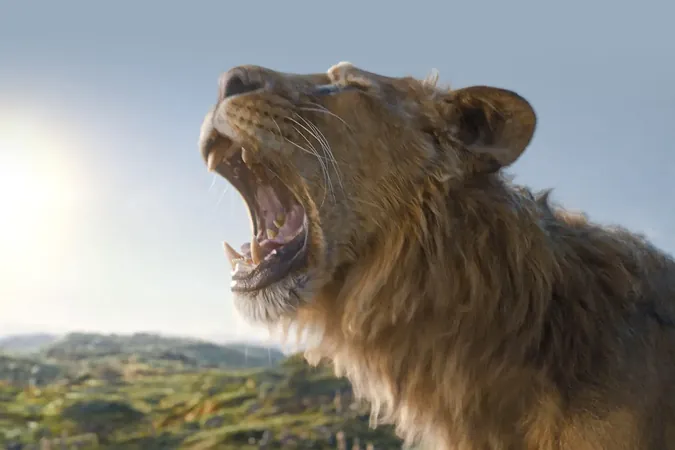
Mufasa: A Stunning Visual Experience, But Does It Roar?
2024-12-18
Author: Yan
Introduction
The latest installment in Disney's illustrious Lion King saga, Mufasa: The Lion King, tells the story of a brave band of animal adventurers on a quest to reach the legendary land of Milele. Their journey takes them over the deepest canyon known in the animal kingdom, an eerie gap that plunges into an abyss. Directed by Barry Jenkins, the movie navigates through the treacherous landscape of technological filmmaking, a realm often criticized for its uncanny valley effects. While Disney markets these latest animated features as 'live-action,' audiences might find that the realism falls just short of what is promised.
Technological Achievement
Five years after Jon Favreau's controversial remake of The Lion King, Jenkins pushes the boundaries of digital animation even further. Upon viewing Mufasa in IMAX 3D, one can't help but be astounded by the lifelike quality of the animal characters, practically leaping off the screen. Rather than filming in traditional landscapes, Jenkins shot the entire film on a virtual stage with actors outfitted in bodysuits mimicking the characters' movements. The result? A spectacle that showcases technological prowess on a grand scale, rivaling the talent of a master artist like Picasso.
Dilemmas of Realism
However, Mufasa faces a crucial dilemma: while the animation soars aesthetically, it sometimes seems overly focused on realism, which distracts from the movie's inherent charm. After all, this is a musical featuring singing lions and quirky side characters, which calls into question the need for realism. The beauty of animation lies in its ability to transcend reality, a skill that allows audiences to embrace imaginative storytelling. A missed opportunity arises when creators shy away from the whimsical nature that animation can unlock.
Storytelling Elements
The story unfolds as a captivating tale narrated by the wise elder Rafiki (voiced by John Kani) to young cub Kiara (Blue Ivy Carter), with comic relief from the beloved duo, Pumbaa (Seth Rogen) and Timon (Billy Eichner). While this setup offers the potential for playful storytelling, Mufasa struggles with a tone that sometimes feels heavy and self-important, detracting from the magic of what a classic animated film could be. Audiences may find themselves yearning for the charm found in the original films rather than this somber retelling.
Character Development
At its core, the narrative charts Mufasa's journey after a dire flood forces him from his home. He quickly finds himself embroiled with a new pride led by Obasi (Lennie James), who sees Mufasa as a rival. There, he forms an endearing bond with Obasi's son, Taka (Kelvin Harrison Jr.), both navigating the trials of their raised expectations and friendships. Yet, as the film inches closer to familiar territory, such as origin stories of beloved characters like Scar, it risks losing its audience in a narrative that lacks novelty.
Screenplay and Music
Co-written by Jeff Nathanson, Mufasa doesn’t quite rise to the cleverness of other recent Disney properties. There are hints of nostalgia, but the screenplay feels burdened by questions few were interested in, like how Scar got his scar. Adding to the film's dreamy yet unoriginal feel are the new songs penned by Lin-Manuel Miranda, which, while charming, don’t quite capture the imagination as the original tunes from The Lion King did.
Conclusion
Despite being structured around profound themes of legacy and aspirations, Mufasa ultimately comes across as an intriguing visual achievement that treads familiar territory. Instead of being a cherished masterpiece, it feels like an unnecessary extension of a narrative many thought was already complete. Nevertheless, it doesn’t mar Barry Jenkins' impressive filmmaking record; instead, it suggests that while technology has evolved, the art of storytelling must not be overshadowed by eye-popping visuals alone.
In the end, Mufasa offers an engaging visual experience, yet leaves audiences pondering: does it truly add to the legacy of The Lion King, or does it leave a blank space on the timeline of animation history? Only time will tell if this tale can roar loud enough to resonate with a new generation.








 Brasil (PT)
Brasil (PT)
 Canada (EN)
Canada (EN)
 Chile (ES)
Chile (ES)
 España (ES)
España (ES)
 France (FR)
France (FR)
 Hong Kong (EN)
Hong Kong (EN)
 Italia (IT)
Italia (IT)
 日本 (JA)
日本 (JA)
 Magyarország (HU)
Magyarország (HU)
 Norge (NO)
Norge (NO)
 Polska (PL)
Polska (PL)
 Schweiz (DE)
Schweiz (DE)
 Singapore (EN)
Singapore (EN)
 Sverige (SV)
Sverige (SV)
 Suomi (FI)
Suomi (FI)
 Türkiye (TR)
Türkiye (TR)